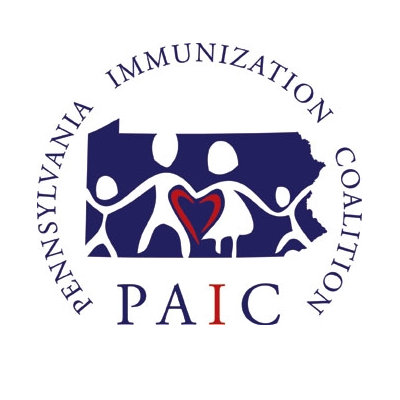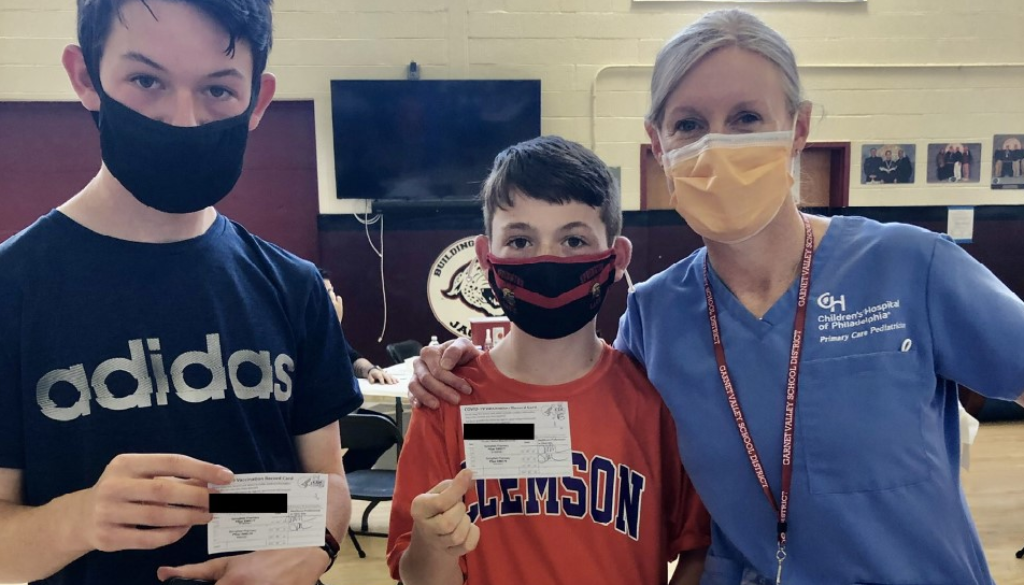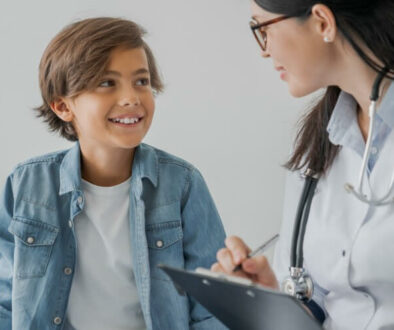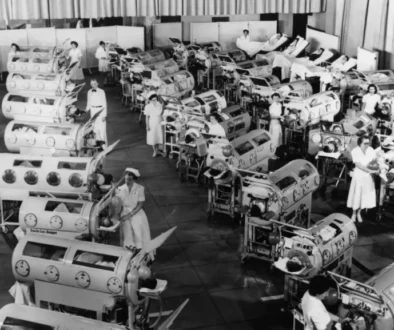Parent to Parent: The Opportunities in Getting My Children Vaccinated Against COVID-19
A Conversation with Dr. Kawan
As the United States approaches 2 full years of the COVID-19 pandemic, mental health problems are at all-time high children. Early adolescence is when youth already experience rapid change physically, emotionally, and socially, and the COVID-19 pandemic has caused immense disruption to this delicate stage in life. The continuous stress, fear, grief, disruption of schooling and uncertainty created by the COVID-19 pandemic has weighed heavily on children and teens, and many are having a tough time coping emotionally.
Prior to COVID-19, Centers for Disease Control and Prevention (CDC) data found 1 in 5 children had a mental disorder, but only about 20% of those children received care from a mental health provider. The mental health challenges of adolescents outside of any loss of family members or friends may be an outcome of isolation, feelings of uncertainty, lack of daily routines, lack of access to health services provided through schools, and lack of advanced emotional development.
A return to some semblance of normalcy is what is needed for our youth, and the COVID-19 vaccine can help achieve this goal. Vaccination plays a critical role in combatting severe illness or death from COVID-19, including those caused by the Delta variant and the now-dominant Omicron variant. It is a common misconception that kids do not get “that” sick from COVID-19, children can and do get very sick from COVID-19 and have both short and long-term complications from COVID-19.
Choosing to get your children vaccinated goes beyond preventing avoidable illness. COVID-19 vaccination presents many opportunities for families and children to get back to what they enjoy. As of November 2, the Centers for Disease Control and Prevention (CDC) recommends all children 5 and older be vaccinated against COVID-19. At the beginning of February 2022, over 8 million kids in the 5 to 11 age group have received at least one dose of the COVID-19 vaccine, and over 6 million are fully vaccinated. 66.6% of the population in the 12 to 17 age group have received their first dose, and 56.4% are fully vaccinated.
Dr. Meg Kawan, a board-certified pediatrician at Karabots Pediatric Care Center in West Philadelphia, discussed her motivations for getting her children vaccinated against COVID-19 with PAIC.
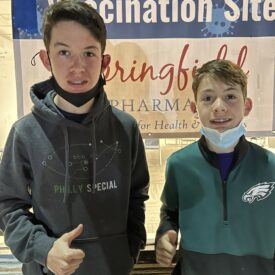
- Your kids are now 10, 13, and 15. How did they adjust to life during the ongoing COVID-19 pandemic?
Like many kids experienced, the adjustment was tough. My youngest was in second grade when the pandemic started, and let’s just say virtual second grade didn’t go well at our house. They did not return to full-time in person school until this past school year. There were some silver linings – I definitely enjoyed them being home a lot more, and life was less hectic in some ways. But it was tough for them to miss out on activities that they loved. My kids really enjoy sports and that was one of the toughest things for them – missing out on their favorite sports seasons.
- Have you always been a vaccine proponent for your children?
Absolutely! As a pediatrician, I have always believed that one of the most important things that we do is encourage and provide vaccines for our patients. Vaccines are truly one of the most amazing accomplishments in public health. They have always gotten every vaccine they are eligible for, as early as possible. At annual well visits with our pediatrician I always remind my kids how fortunate they are to be protected against so many diseases by vaccines.
- How did your family come to the decision to get your children vaccinated for COVID-19?
Like many families, I was anxiously awaiting the emergency use authorization for kids to receive the vaccine. I was so fortunate to be vaccinated against COVID very early, in December 2020, and the sense of protection I felt was really life-changing. I wanted that protection for my kids. I craved information about studies of the COVID vaccines with kids and was so happy to read that the Pfizer vaccine was safe and effective in adolescents and children.
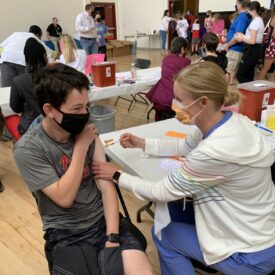
- How did you discuss the vaccine with your children?
Since we had discussed it so often at home, it was really something they were excited about. They couldn’t wait for their turn! When the EUA for the 12–16-year-old age group came out, we celebrated. I was able to get them vaccinated a few days later and it was one of the happiest weeks of our year. Their school district hosted a vaccine clinic in partnership with a local pharmacy, so I was able to volunteer at the clinic, and actually gave them their vaccines. It was such a powerful moment that I will never forget. It was also so great to be part of vaccinating their friends and their school community. The kids were so grateful to receive this protection, and it made me stop and appreciate the impact this pandemic had on their lives. As I got ready to give each adolescent their shot, I’d ask, “What are you most excited about doing after you are vaccinated?” Their answers were so inspiring!
I think the hardest part at that point was that my youngest was still not eligible. That was really difficult to discuss with him, but it was a good learning opportunity for them to understand how vaccines are extensively tested for safety before they are released. When his opportunity came in November, he was thrilled to get his shot! I celebrated with him by getting my booster at the same time.
- Did your children have any side effects from their vaccine?
They were all totally fine after their vaccines. My older two were vaccinated during baseball season, and they both went right to a baseball game after the vaccine. My youngest got his first vaccine and went immediately to soccer practice. They all had very mild side effects with their second vaccine. One had a headache, one had a low-grade fever and the youngest was pretty tired the next day, but that only lasted about 12 hours. I told them they all had healthy immune responses, and they resumed their normal activities the following day.
- Have they been attending school virtually or in-person? Are/were they excited to return to school in-person since getting vaccinated?
They started attending school full-time in-person beginning this school year. I felt so much more confident with my older two going back knowing they were vaccinated. I know they were excited to get back (although they are teenagers, so they don’t always admit it). It was hard sending my youngest off to school this September without him having that protection. That was a tougher decision, but ultimately, I felt the benefits of in-person school for him outweighed the risk of COVID. But I definitely worried about him much more. Now that he is fully vaccinated, I feel a lot more confident with him being around other kids.
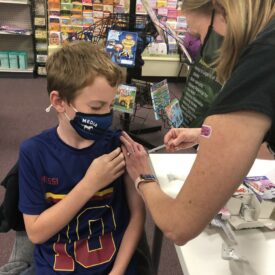
- How comfortable are you with them attending school in-person now that they are vaccinated? Do you encourage your kids to wear masks in schools and do you have any recommendations for parents on how to encourage masking with their kids?
I am so relieved that they are vaccinated now and that my older two are boosted. I absolutely encourage my kids to wear masks in school right now at this point in the pandemic and their school district mandates it. At first, they gave me a little pushback and one of them said, “But I thought we wouldn’t need masks if we were vaccinated.” When I explain about the layering of protection, particularly with this Omicron surge, they understand. My youngest is so accustomed to wearing a mask that he almost always forgets to take it off when he gets home. It’s become a normal part of their routine.
- What are the main activities being vaccinated has allowed them to do again that they are most excited about?
They would probably say playing their sports, and knowing that they have protection to hang out with their teammates. There were so many things that they were really excited to get back to doing. We went to see the Phillies play last summer a few times, which they totally love. We’ve been going out to dinner occasionally, which we had totally stopped doing. They have been able to socialize with their friends in a way that wasn’t possible before and it’s great to be able to see them do that again.
- Does your family have any exciting future/summer plans now that everyone is vaccinated?
We were able to get together with extended family over the holidays, which I would not have felt comfortable doing if everyone had not been vaccinated. Next month we are going skiing for the first time since the pandemic and this is an activity that we love to do as a family together. I am so excited!
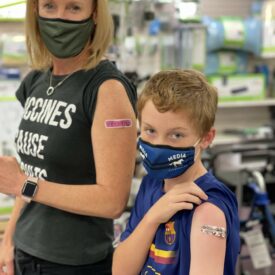
- Why is it important for other families to get their children and adolescents vaccinated against COVID-19?
The COVID-19 vaccine is our number one best protection against this virus. It’s an incredibly powerful tool in reducing the risk of children and adolescents getting sick from the virus and reduces the chance of spreading it to other people. It’s amazingly effective and it’s shown to be extremely safe. It’s a common misconception that COVID is a “mild disease” in children. Over these past two years I’ve cared for children who have been extremely sick with COVID and this year COVID will be one of the top ten leading causes of death for children in the United States. We know that vaccines are very safe in effective against other diseases in children. The COVID vaccine is no different and I encourage families in my practice to get their kids vaccinated as soon as possible.
COVID-19 cases and hospitalizations are seven and 11 times higher in unvaccinated adolescents respectively, compared with their vaccinated counterparts according to the American Medical Association. Getting a COVID-19 vaccine can help protect kids from contracting the virus and help decrease disruption in their daily lives, giving them more time for recreation and learning.
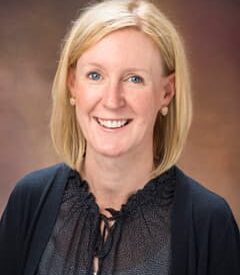
Dr. Meg Kawan, MD, MPH, IBCLC, is a board-certified pediatrician at Karabots Pediatric Care Center, West Philadelphia. Dr. Kawan received her Doctor of Medicine degree from the Pennsylvania State University College of Medicine in Hershey, PA and her Master of Public Health from the University of North Carolina Chapel Hill in Chapel Hill, NC. She completed her residency at the Children’s National Medical Center, Washington, DC
Dr. Kawan has been a fellow for the American Academy of Pediatrics since 2002 where she is a member of Sections on Hospital Medicine and Breastfeeding. She has also been a member of the Academy of Breastfeeding Medicine since 2007. In 2012, Dr. Kawan received the American Academy of Pediatrics Special Achievement Award for her work as Nevada Chapter Breastfeeding Coordinator.
